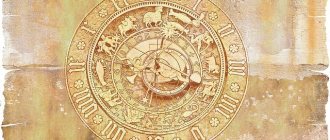Traditional answers to the question of the meaning of life suffer from incompleteness
However, it is difficult for a person to live without thinking at all about the meaning. As reasonable people, we constantly ask ourselves questions: why am I doing something? for what purpose? Why, for example, do I work day and night without raising my head? The modern world puts the concepts of efficiency and productivity at the forefront; modern managers are taught to evaluate almost every minute of their working time in terms of results. So the question of goals and meanings arises in full force. And from here it’s a stone’s throw to the question of the meaning of life.
You can often hear: the meaning of my life is in children . We need to raise them to be good people, give them a decent education, teach them independence - this is the main thing. Well, it's important, no doubt about it. But is this the most important thing in life? And if a person did not create a family and did not give birth to children - what, now he does not have a life, but a meaningless vegetation? And if something went wrong with your children (not necessarily through your fault) and they did not grow up brilliantly educated and not ideally brought up, does that mean your life didn’t work out either? Or, let’s say, you put all your strength into your children, devoted yourself entirely to them, and the children studied at a prestigious university, got a well-paid job - and remember what their name was, they don’t even wish you a happy birthday; Isn't that what happens? And what then is the meaning of your life?
Not to mention the fact that, in a purely philosophical sense, it is quite absurd to connect your entire life completely with your children: after all, then the meaning of their lives will also have to lie in their children (your grandchildren), and the meaning of their grandchildren’s lives – in their offspring (your great-grandchildren) and so on ad infinitum. That is, for everyone, the meaning of life will be directed somewhere into the “beautiful far away”...
Another popular answer: the meaning of life is to achieve maximum self-realization, to achieve all the important things in life . As in the well-known formula: “build a house, give birth to a son, plant a tree.” It sounds nice, but who can accurately determine what is important in your life and what is not? In old age, people often bitterly admit that they devoted too much time and energy to the pursuit of illusory goals that, as it turned out at the end of life, had no value. A man built a career, but destroyed family relationships; I was looking for eternal love - and remained lonely; He sacrificed everything for the sake of his favorite job - and the enterprise where he worked all his life was taken over and closed as unprofitable.
Or a person built the same house, seemed to have accomplished an important thing in his life, but some ten years passed - the roof became leaky, the foundation tilted to the side after the winter frosts, cracks appeared in the windows, and the radiators were leaking. And again you need to spend energy, money, and time, and it is unknown how many more repairs this house will survive and whether it will remain suitable for the life of your children when you yourself are no longer here. And will they still want to live there? Maybe everyone will run away in different directions, and this home, for which you worked so hard, will stand abandoned among the weeds.
Another popular “meaning of life” (let’s put it in quotation marks) is to experience and learn as much as possible in life, to see the world, to fill your soul with impressions and your mind with knowledge . It is clear that this “meaning” is also very conditional: after all, no matter how much you experience and comprehend, it will still only be a drop in the ocean of universal human knowledge and experience. In addition, the ancient Greek philosopher Heraclitus noted: much knowledge does not teach intelligence. Well, then, what is the point of mechanically increasing the number of impressions or facts stored in memory if this does not solve the most global problems of my life: it does not make my loved ones happy, does not protect either me or them from aging, illness and death. A sudden stroke - and yesterday’s erudite, charming person and fascinating conversationalist rapidly regresses to the level of a three-year-old baby. Has the meaning of his whole life really disappeared along with his memory and sharpness of mind?
Maybe, thanks to some medical knowledge, I will be able to extend my life by three or even ten years. But what will they mean from the point of view of eternity? And if a person is destined to die one way or another, then is it fundamentally important when exactly this happens - in twenty years or tonight? From the point of view of eternity, he is already dead. And is it really important how many facts (out of a truly countless number) he manages to remember, how many tens, hundreds or thousands of books (out of billions written) he manages to read, if all this knowledge accumulates in his head for a short time? .
Of course, the meaning of life can be found in much more noble things, for example, in selflessly serving your neighbor, caring for the poor and sick, giving yourself to people with their many needs . It would seem, much higher? But even here disappointment awaits us. Sorrows, illnesses and poverty surround a person everywhere, and we are most often unable to radically correct the situation in which this or that sufferer finds himself. No matter how much you give to a beggar, tomorrow (maximum in a week) you will see him again in the same place in the same position with his hand outstretched. No matter how much you care for a patient in a hospice, you will most likely prolong his earthly days for only a short time. This in no way means that acts of mercy are meaningless - no, they are incredibly important. It is not at all indifferent in what state of mind a patient in the palliative department passes away; will he die in complete loneliness, despair and fear, or will he pass away peacefully and calmly, until the last minute feeling the palm of another person in his hand.
And it would be entirely possible to agree that this is the meaning of life - to do good deeds while you are able, if not for this “but” that we have already mentioned. The good that we are able to create (even if it is real good, and not just our personal “idea of beauty”) cannot save anyone. Usually we cannot help another person once and for all, solve his problems radically. We can lighten the burden of his burden, partly “unload” it, as the righteous saint Alexy Mechev (1859-1923) put it. It is in our power to slightly limit the effect of evil in this world, and this is certainly worth living, but it does not make my life absolutely, fully fulfilled, because I cannot truly complete a single good deed. Not to mention what not at all kind feelings (irritation, contempt and even outright hostility!) sometimes flare up in me towards those people for whom I try to do this kindest thing...
And man returns to the same thing: vanity of vanities... everything is vanity! (Ecclesiastes 12:8).
Thesis 3.
Conversations with the priest. The meaning of life, or What makes a Christian different
Audio |
In the St. Petersburg studio of our TV channel, the cleric of the Church of the Nativity of John the Baptist in the village of Yukki, Vyborg diocese, priest Mikhail Kudryavtsev, answers questions from viewers. – The topic of today’s program is the meaning of life or how a Christian differs from others.
As a child, it always seemed to me that I didn’t know something that didn’t allow me to be a truly happy person. It seemed that everyone knew some important “thing” in life, but I don’t know it and, out of my stupidity, I live in a way that I shouldn’t live. I lived in this state for quite a large part of my life. Only after I turned to the Lord and began to read and reflect on something, I suddenly had the feeling that I was beginning to understand something. But I still don’t have absolute confidence that I live the way people should live. When you suggested discussing the topic of the meaning of life, I happily began to prepare for it: I really want to know not only what the meaning of life is, but also how a Christian differs from others.
- Let's start with the second question, because it would be good to get rid of illusions right away. If we begin to compare a Christian with others in the modern world, then we are faced with a difficult task. What makes an Orthodox Christian different? We will talk about Orthodox Christians, but to make it easier, we will simply say “Christian.”
Christians pray. Yes, but not only Christians pray. There are other religious movements, spiritual practices, which also involve constant prayer and reading mantras. I’m not saying that this is the same, but an outsider who starts comparing will say that they pray there too. Christians fast. Let's be honest, our fast cannot be compared with the diet of the same vegans who now advocate a healthy lifestyle. A healthy lifestyle is now generally promoted in the world. Here we are also not ahead of the rest. If we talk about morality or works of mercy, we will come to almost any charitable foundation and meet there a variety of non-believers who simply found some meaning in this and follow it.
Thus, based on some external signs, we do not find any radical differences in modern civilization. Christians don't sin? They also sin. Unfortunately, we are not a company of saints. I would like to! But no. Let's be honest with ourselves. It turns out that after all, what distinguishes Christians from others is invisible. This is something that is hidden within ourselves, some internal driving force, motivation, some meaning that distinguishes us from everyone else.
The question of the meaning of life has been raised, probably, from the very beginning of the human race. If we reflect on the Book of Genesis, we will understand that man already then began to search for the meaning of life. Secular philosophy has different answers to these questions. Some philosophers (like Viktor Frankl) said that there is no objective meaning as such and we must create it for ourselves. There were classical trends (for example, hedonism), when the meaning of life was pleasure. This is still relevant today, although the name is ancient. Many people, who are not even aware of it, who do not formulate for themselves the meaning of life, very often live precisely for the sake of pleasure, for the sake of consumption: from purchase to purchase, from acquisition to acquisition, from party to party. Everyone consumes things differently.
The noble meanings of life, which are considered by philosophers, include, for example, creativity. Philosophers say that creation has meaning. Service, acts of mercy, and sacrifice are also considered as the meaning of life. If we speak in a secular manner, then neither this program nor a whole series of programs will be enough for us to consider all the possible answers that secular philosophy gives us to the question of the meaning of life.
But we must look precisely from a Christian perspective at what distinguishes the opinion of Christians from the entire spectrum of different opinions about the meaning of life. It’s probably worth looking at our fundamental prayers, at the fact that at every liturgy the whole people sings: the Creed and the “Our Father.” Is there at least some answer to the question about the meaning of life?
A small note: we must somehow formulate the meaning of life. Someone will say that his meaning of life, for example, is in God. But here questions arise. Firstly, ideas about God can be different. Secondly, what does the meaning of life mean in God? How is this expressed? Everything is always expressed in action. This means that we must formulate the meaning of life with a certain verb. If a person believes the meaning of life is in creativity, then he says that he sees meaning in what he creates. If a person believes the meaning of life is in consumption, he says that he sees meaning in what he eats.
But verbs are different. There are verbs of action, and there are verbs of state. The question cannot be applied to state verbs: what are you currently doing? There is no such clear division in the Russian language, although this is also monitored and indicated in grammar textbooks. In English this is expressed more clearly.
The Creed begins with the verb “I believe.” I believe is a verb of state. You cannot answer “I sit and believe” to the question: what are you doing now? I either believe or I don't believe. This is some kind of condition. Like a switch: on or off. The same applies to the verb "to know". It is impossible to imagine that a person, when asked what he is doing, would answer: “I know.” He can recognize, know. These are other verbs, and the verb “to know” does not apply to this. The same applies to the verb “confess.” In our Creed we have the verb “I confess.” This is also a state verb, which means that I recognize something as true and am ready to tell about it. But I can’t say that I’m sitting and confessing now. The priest can say that he went to confession and is confessing. But this has a different meaning.
In the Creed we find one verb, which is a verb of action - “I am waiting”: “for the tea of the resurrection of the dead and the life of the next century.” You can wait actively, you can wait for a long time, you can wait for years, but the Church waits for centuries. The Apostle Paul has the following exclamation in his epistles: “Lord, come!” In general, before this was a liturgical exclamation, that is, this exclamation was heard during the service. This expectation really makes sense. But this meaning needs to be formalized again, and, probably, the prayer “Our Father” will help us here, which, unfortunately, we also rarely and weakly think about. Let us remember: “Our Father, who art in heaven! Hallowed be Thy name, Thy kingdom come, Thy will be done..."
We are interested in these three verses: “Hallowed be Thy name, Thy kingdom come, Thy will be done.” To be honest, it’s not very clear what we’re talking about. What does “hallowed be” mean? Let it be glorified! But all this is somehow difficult to perceive. We are used to reading this, we are used to repeating it, but it is impossible to say that there is some kind of internal experience of these words.
– Question from a TV viewer: “My eyes hurt, so during evening prayer, instead of reading a book, can I watch TV and pray?”
- Certainly. The main thing is that you pray. But from a book or on TV - it’s not so important.
Let's return to the three verses of the Lord's Prayer. Now let's imagine that we are in occupied territory. We see enemy flags, banners, and various enemy symbols around us. We are terribly sick of this. A cry ripens in our soul: “Hallowed be Thy name!” That is, let the flag of my Motherland, my Heavenly Fatherland, finally be consecrated instead of these damned enemy banners. We are here with you under occupation. The enemy has captured this land, and we are waiting for the Lord to come - and finally everything that is enemy will be destroyed. And there will be no more enemy banners, there will be no more sin. We are waiting for this to happen.
When will this happen? Next verse: “Thy kingdom come.” When the Kingdom of God comes, then the enemy’s banners will be destroyed, God will be all in all; and the name of the Lord will indeed be hallowed. What will happen when the Kingdom of God comes? The age of the will of the Lord will come. “Thy will be done as it is in heaven and on earth.”
By and large, these three verses are about one thing: that the Lord will finally come, that sin will be destroyed, that the enemy will be defeated, that the enemy’s banners will be trampled underfoot, and that the banners of the Kingdom of God will be raised. And finally everything will happen according to the will of God.
When we imagine ourselves as people suffering under this terrible occupation, then it becomes clear to us why the Creed ends with such a key verse: “I look forward to the resurrection of the dead and the life of the age to come.” It's not just like that. The Creed is a very condensed, compact creed; there is nothing superfluous there at all. The Creed contains key truths about God the Father, the Son, the Holy Spirit, literally one verse about the Church, one verse about the sacraments (it doesn’t even talk about all the sacraments, only about baptism). And suddenly - some kind of “tea”, “waiting”. Why? Because this is key, fundamental knowledge: the Lord will come, and we are really waiting for Him. And this makes sense. I actively wait for Him and wake up with the thought that the Lord will come. Maybe it will not come for everyone, but for me personally, because my death can come suddenly - then the Lord will come for me personally. But this is not so important. I look forward to meeting Christ. As the Apostle Paul writes: for me to live is Christ, and to die is gain.
Christians have been in this state of expectation for centuries. But then it began to be forgotten, blurred. In general, it was probably precisely with this that the decline of the Christian spirit in general, the Christian worldview, began to occur. Why?
Imagine that we were captured by some enemies with cannibalistic habits. They captured us, but left us alone: they say, you can live, but according to our new laws, you can be cannibals like us. But we still hope that our kingdom will return, we want to live only according to the laws of our kingdom. When the Lord comes, He will judge according to the laws of His Kingdom, and I do not want to give in to the laws of this world. It is very important; this is the general incentive for the moral perfection of a Christian.
And I would like to say one more thing. A person who is waiting for the Kingdom of God should not be a slacker. This doesn't mean he just sits and waits. After all, when you and I are waiting for something, we usually keep ourselves busy with something. In this state of expectation we can occupy ourselves with the noblest activities. It could be creativity, service; in a sense, there is even a certain level of consumption when we are not sinners: the Lord gave us food, the sky, the sun, nature, and we can look at all this and rejoice at all of this. Consuming the gifts of God is normal and good. In a state of waiting for Christ, this becomes not an end in itself, but only temporary employment for the glory of God.
For example, a worldly person has set himself a task, the meaning of life is creativity. He can burn out, as they say, write himself out (if we speak in a writer's way). That is, suddenly his meaning in life disappeared: there was creativity and it disappeared. And he has a crisis again - he has lost his foundation. This will not happen to a Christian, because he is waiting for Christ, and this will not go away, will not disappear. This will disappear only when Christ comes, but then there will be no questions at all - God will be all in all, there will be happiness, paradise. Therefore, if suddenly a Christian, as they say, has written himself out, it’s okay, he can do something else, because this is not an end in itself.
– Question from a TV viewer from the Voronezh region: “Sometimes you wonder what our lives are spent on. Ninety-nine percent of the time is spent earning money, spending it, eating, dressing, and so on. Are we ready in our essence for the Kingdom of God? What will we do there if we only know how, as they say, to work on our body? We spend only one percent of our time on spiritual life. The Holy Fathers say that we will pray there. But we are not even fit to pray. Sometimes it’s even scary..."
- Very good question. We missed another of the popular meanings of life, which is often voiced as improvement. Neophytes often step on the rake of this meaning of life. A person comes to Church, reads monastic ascetic works and says: I will strive for perfection. And it begins: unreasonable fasting, long hair, beards, tarpaulin boots, pilgrimages (sometimes unreasonable). And so on. But time passes, and the person realizes that he has weakened and has not dealt with the root of his problems: the passions were and still are.
Often during the period of neophyte a person can give up alcohol, smoking, some of his addictions, and entertainment. Some time passes, and he suddenly falls even lower than before. Although, it would seem, a believer. He comes to confession and says: “How is this possible? It turns out that I have fallen even lower...” The return, as they say: jealousy beyond reason gave birth to such a fiasco. But this sobers up a person, and he understands that perfection cannot be considered the meaning of life simply because it does not depend on us.
Blessed are the poor in spirit, that is, those who have realized that they themselves cannot do anything. Whatever the Lord makes of us, that will be. The Kingdom of God is like leaven that leavens flour. But how soon this will happen to me personally, I don’t know; this process goes on hidden for me. The Gospel also talks about this: a man sleeps at night, gets up and does not see how the harvest grows. We don’t see sprouts growing in the field; we simply discover day after day that the sprout first suddenly appeared, and then matured.
It's the same here. Perfection, unfortunately, cannot become our meaning of life. Although I really want this perfection. This desire for perfection fuels our thirst for an encounter with Christ. Because I know: when Christ comes, He will cleanse me, make me something else, give me another body, which will not have to be looked after as the TV viewer just said.
For now we just have to be patient. You and I are traveling on a train: some in a more comfortable carriage, others in a less comfortable one. Our task is to complete this journey with honor and dignity. But we know where we are going, and we are looking forward to arriving at the final station where Christ will meet us.
It is very important to understand that our worldly affairs, our endless worries do not separate us from Christ. The Apostle Paul says: who will separate us from the love of God? Neither sorrow, nor cramped conditions... The Apostle Paul made tents, and this did not stop him from waiting for Christ and exclaiming: “Lord, come!” These are simply necessary concerns while you wait.
For example, another popular meaning that is declared is in children. They say: the meaning of life is in children. If we are waiting for Christ, then there really is some point in having children, because we are preparing those whom we will lead to Christ. We give birth and raise those who will also wait for Christ. There is no point in procreation for the sake of procreation. Giving birth to people so that they go into eternal torment is, let’s be honest, not a great feat. Our task is not just to give birth, but to create and formalize a Christian who will also wait for Christ and ride with us, in our compartment, to meet the Lord.
If a person does not believe in Christ (or unconsciously believes), and sets his priorities incorrectly, then the meaning “for the sake of the children” can turn into the most terrible things. Yes, to some extent there can be good sacrifice. But, on the other hand, we said that there must be a verb. I like serving children – good. I like helping children - good. Or maybe I like to be in control? I control the children. I live for the sake of children, the meaning of my life is children. But what am I doing? I control my children, I limit my children. And so on. These are things that can no longer be called Christian; they make a tyrant out of a person. Although the meaning is formulated in the same way: the meaning of life is in children. But this meaning can be realized in very different ways.
If we are waiting for Christ, that is one thing; here control may be with the goal of protecting a person from harm. And if we are not waiting for Christ, then control may be for the purpose of pleasure. I'm afraid of death, I don't know where I'm going, and I cling to my children as an island that gives me the illusion that I'll never die. This is a nightmare! This is vampirism; It’s like a leech that sticks and doesn’t let either the children or themselves live.
“We can say: I love my child.” We can only replace the concept of “love” with the concept of “violence”.
– Again a popular declared meaning. People say: my meaning in life is love. But what do we mean by this concept? John the Theologian said: God is love. If we remember this, that’s one thing. If my meaning of life is love, then my meaning of life is the Lord. If the meaning of life is the Lord, then I love the Lord. And if I love the Lord, I wait for the Lord. Then everything is connected into one harmonious picture.
But a person can put something else into the concept of “love” (let’s not even talk about some vulgar directions). Sometimes people even say sublimely: the meaning of my life is love for my husband (or wife). And the husband (or wife) actually groans from this love. Because love can be from the Holy Spirit, or it can be vampiric, hungry, greedy love...
- From the evil one.
- Yes. Therefore, it is important what we believe the meaning to be. It is not for nothing that the Lord says: “Whoever listens to My words and does them is like a wise man, building his house on the rock.” Now, if we put the expectation of Christ as the basis of our life (I am waiting for Christ, I love Christ, I yearn for the Lord, I can’t wait for this meeting to happen), then this will have a lot of other wonderful, varied meanings.
According to the wonderful psychologist and psychotherapist Viktor Frankl, we can create and invent meanings for ourselves in life (even in illness). Viktor Frankl was a concentration camp prisoner. One of his key thoughts was precisely that sometimes we do not see anything bright in which we could discern the meaning of life. He reflected on how difficult it was for him in the concentration camp, when people were dying around him and there was no hope. What could be the meaning of life there? And he finds him in suffering. Just like Saint Luke (Voino-Yasenetsky), who wrote the book “I Loved Suffering.” But this can be done if we have this meaning in waiting for Christ.
Waiting for Christ is always bright, always joyful. But it’s always sad, sad, because I don’t know when this will happen. On the other hand, I know that this meeting will take place. Then I can give meaning to my suffering, because I can suffer for the sake of something. I can suffer and pray that the Lord will help other people through this suffering; so that the Lord, through these sufferings, will cleanse my old sins. And so on. When we see other people suffering, we can pray for these people and believe that these people will come to Christ through this suffering. And if they see this hope, this hope in our eyes, then suffering will also become different for them.
It is very healthy, wonderful, when the expectation of Christ becomes the foundation. “It’s impossible to move or push him.” And even when everything collapses, this foundation remains - and you can again come up with new meanings for yourself. For example, there is a glass of water on the table: even in this glass of water you can see some meaning, you can begin to think, philosophize. After all, thinking, the ability to think, also has meaning.
– I would like to ask one more thing. Our own life often seems like a kind of nonsense to us (as the TV viewer who called said) due to the fact that we devote a lot of time to, as it seems to us, not very high things. One of my good friends told me how he recognized the Lord: he thought about the process of breathing. We just don't appreciate this gift. In general, we often do not appreciate the gifts of the Lord in our lives, we do not notice His presence. So he saw the presence of God in his breath. He thought that if this process suddenly stopped, then that would be it... Someone is led to faith not by suffering, but by the fear of death. Especially now, during a pandemic, when we see the death of other people, this fear forces us to turn to the Lord. The question is: do you know examples when a person comes to God out of gratitude? Because the Lord gives us the opportunity to live.
- Of course, there is gratitude. But through what did this gratitude come? It can also come through some kind of sorrow, when it ends, through healing from an illness.
You were very correct about breathing. Let every breath praise the Lord. Gratitude for even our breathing is extremely important. Let's think about what a person does when he is waiting for the one he loves. He usually remembers him. After all, the Lord did not just establish a sacrament on earth, which is called “remembrance.” The Lord says: do this in remembrance of Me, when at the Last Supper He gives His Body and Blood to the disciples under the guise of bread and wine.
Unfortunately, not all churches have the opportunity to hear priestly prayers, but these prayers list the blessings that the Lord has done for us. The cross, the tomb, the three-day resurrection... We pray and say: about blessings, we know them and we don’t know them... and about this service... We give thanks for everything: for breathing, for sorrows, joys. We give thanks and remember Christ. Therefore, at every liturgy we read the Holy Scriptures, the Gospel, the Apostolic Epistles - we remember. When the Liturgy of St. Basil the Great is served, there is a lengthy remembrance - starting from Adam and Eve. We remember, and wait, and give thanks. This is extremely important.
And when the expectation of meeting Christ becomes a reality for a person, then the attitude towards death changes. You said that the fear of death brings people to God. Yes, it does, but it’s bad if this fear of death remains. Because this fear must be reborn. Many saints wanted to be with Christ and said that it would be good for them to come to Christ. As the Apostle Paul writes: I have a desire to be resolved and be with Christ, because this is incomparably better; but remaining in the flesh is more necessary for you. That is: for your sake I remain here, for your sake I still trample this sinful earth, but I would like to be resolved and be with Christ. And so many saints wrote.
And many martyrs, in general, therefore went to torture: they understood that the torment, the torture that they would have to endure was the door through which they would pass. Weighing some 40–50 years of life on earth and torment (and not just torment, but torment with a martyr’s crown; this is a special reward), they preferred to go towards Christ through torment, despite death. Death is just a doorway through which the body cannot pass. This realization comes when a person waits for Christ.
I will again turn to the TV viewer who asked the question. The Lord says: in My Father's house are many mansions. There are many abodes, and the Lord will find for everyone a place that will correspond to his soul and his dispensation. There will be a place for the saints, and for the martyrs, and for the saints. And there will also be a place for a pious housewife; the Lord will definitely prepare it.
- It's a good idea. I didn't think about it. It always seemed to me that there is some reason why, one way or another, we can count on God’s mercy. After all, He loves us unconditionally...
If we wait on the Lord and appreciate His love for us, then maybe it’s not so scary. But overcoming the fear of death is a topic that makes sense to talk about separately. I really hope that you and I will meet soon and talk about how to overcome the fear of death. Do we really have the opportunity and joy to overcome it?
– I think there is. It probably looks like two streams that have met. Death comes in one stream: dirty, black. Waiting for Christ, for meeting Christ, is a bright, revitalizing stream; the main thing is that this flow becomes stronger in us - and then it will win.
Presenter Gleb Ilinsky
Recorded by Taisiya Zykova and Nina Kirsanova
Belief in God does not guarantee that a person's life will be filled with meaning
Ecclesiastes lived three thousand years ago. One would hope that science, education and technological progress have since changed things for the better. But here’s what the French existentialist writer Albert Camus stated in the mid-20th century: life is absurd, absurd by virtue of the fact that it always ends in death. And if the lack of meaning in life should not lead a person to suicide, it is only because he is left with the opportunity to rebel against this absurdity...
Camus could not see any meaning in life due to the fact that he adhered to a radically atheistic worldview. All attempts to involve God in explaining the absurdity of man’s relationship with the world seemed to him to be a scam, an evasion from the harsh truth of life. Other existentialist philosophers, such as the Dane Soren Kierkegaard and the German Karl Jaspers, on the contrary, brought religious faith into their thinking as the only way to give meaning to life. But this did not make their philosophy much more optimistic. Faith in God in itself does not free a person from the oppression of meaninglessness.
Atheism did not become popular until the end of the 18th century. The vast majority of people have always proceeded from the fact of the existence of God (or gods). But in the pre-Christian era, there was an idea that God blesses the righteous only in this earthly life, rewarding him with earthly goods and joys, family happiness and human respect. But with death a person loses everything. And from this point of view, everything that a person strived for during life turns out to be meaningless. In the grave, where you go, there is no work, no reflection, no knowledge, no wisdom (Eccl. 9:10).
Many modern people will agree with the conclusion that follows from this: thank God for what you have and don’t think about the future. Go, eat your bread with joy, and drink your wine with joy in your heart, when God is pleased with your deeds. May your garments be bright at all times, and may the oil on your head not fail. Enjoy life with the wife you love all the days of your vain life, and whom God has given you under the sun for all your vain days; because this is the portion of your life and of your labors, in which you labor under the sun (Eccl. 9:7–9).
Neither purely earthly, nor even religious answers to the question of the meaning of life “work” until the end, as long as the prospect of this life remains eternal death. A joyful and prosperous life with a family, a “house is a full cup,” good health and self-realization - all this is wonderful and blessed by God, but it acquires meaning only when multiplied by eternity, and not by death, which nullifies everything.
Thesis 4.
The meaning of life in Islam
The meaning of life in Islam presupposes a special relationship between God and man. The main goal of followers of Islam is submission to God, surrendering oneself to Him. This is why the followers of this religion are called devotees. There are words in the Koran that God created man not for the specific benefit of God, but to worship Him. It is in worship that there is the highest benefit.
According to the main Islamic tenets, Allah is supreme over everything, He is merciful and merciful. All believers must surrender themselves to Allah, submit and humble themselves. At the same time, all people are responsible for their own actions, for which the Lord will reward at the Supreme Court. After the Judgment, the righteous will find themselves in Paradise, and sinners will face eternal punishment in Hell.
Lecture by professor of the Moscow Theological Academy and Seminary A.I. Osipov.
The true meaning of life appears when the fear of death disappears
It was revealed to ancient Israel that one day the Messiah-Savior would appear in the world, the One who would deliver people faithful to God from enslavement and bring them into the Kingdom of love and peace, where there would no longer be any reason for sorrow. But neither Ecclesiastes nor other people of the Old Testament Revelation dared to hope for the prospect of eternal life. This perspective was revealed to people only by God incarnate, the Lord Jesus Christ.
For those who believe in Christ, life is by no means an accident (as for an atheist or, for example, a Buddhist). Life is a gift from God. And a gift is not some pragmatic act when one gives one’s own and waits for the kindness to be returned; it is something that is given out of abundance, given simply because the giver is generous and wants to please the one he loves. This is exactly how God is understood by Christians. He calls each of us to life in order to share with us His joy, His bliss, not for some time, but forever. After all, God Himself is eternal. Another thing is that accepting such a gift is not at all easy for us. We also need to want to live in eternity with God, to make a free choice in favor of such a life. After all, when the Lord created man, he created a being similar to Himself: And God created man in His own image, in the image of God He created him (Genesis 1:27 ). This means, among other things, He created a free being.
From the Bible we know how the first people took advantage of their freedom. They were seduced by the words of Satan, who appeared in paradise in the form of a serpent and promised that by eating the fruit of the tree of the knowledge of good and evil - the only one from which God forbade the first people to eat - they themselves would become like gods (Genesis 3 :5). That is, they will receive some kind of surrogate of bliss (oh, it was no coincidence that the word how was pronounced!), without even turning to God. They will become like gods - but apart from God. By believing the fallen angel and violating the clearly expressed commandment of God, Adam and Eve essentially signed a distrust, and therefore insufficient love for the Father.
The Lord was ready to forgive them for this mistake, as long as it really turned out to be a mistake, and not a conscious betrayal. He presented Adam and his wife several times with the opportunity to repent. [Adam,] where are you? - the Lord called out to the first man when he was hiding from Him among the trees of paradise (Genesis 3 :8, 9). The holy fathers interpret this question from the omniscient God (who knew perfectly well where Adam was) as an invitation to look at himself and admit that he stumbled, which Adam did not do. Who told you that you are naked? have you not eaten from the tree from which I forbade you to eat? (Genesis 3:11 ) - Adam could also answer these questions honestly and ask for forgiveness for disobedience, but he chose to blame his wife for everything, and indirectly, God Himself, who gave her to him. The wife, in turn, easily blamed the serpent for seducing her (cf. Gen. 3:13 )…
Repentance did not occur, and what was a mistake has now become a conscious departure from God. As a result, not only the first people, but the whole world suffered a catastrophe, which Christians call the Fall. The carnal, material things prevailed in man over the spiritual, man became mortal, and nature, once his natural habitat, now became the “external world,” menacing, dangerous and unpredictable.
The state in which fallen man found himself was excellently described by the Apostle Paul: I know that nothing good lives in me, that is, in my flesh; for I can desire, but I cannot do good. For I do not do the good that I want, but the evil that I do not want, I do (Rom 7 :18-19, translated by Bishop Cassian (Bezobrazov)). Therefore, in fact, all those mundane goals and meanings that we are trying to find for our lives “do not work.” Having lost a direct connection with God, we have so devastated, as if exposed, our lives that now we need some external “goals”, “meanings” and “justifications” for our existence - just for ourselves, in order to somehow explain to ourselves, what are we doing here and why. But these “goals” and “meanings” explain nothing any better than aprons of leaves covered the nakedness of sinners.
Of course, we strive for good: to raise children, or build a house, or improve our professional skills, or enrich our minds with the wisdom accumulated by humanity over many centuries. But we often act incorrectly - and break wood. Lots of firewood. And all because these earthly, far-fetched “meanings” obscure from us the main meaning of our life. The one that has already been given to us by the Giver of life Himself, our Creator, and which we can only freely accept. Or just as freely refuse, because the story of Adam and Eve reminds us again and again that freedom can be abused...
Thesis 5.
Spiritual meaning of life
Everything will end with the biological meaning of life for atheists. There is no God, no faith, no meaning in life, we are all just a chain of evolutionary development, nothing more. For religious people , on the contrary, everything is just beginning.
A person comes into this world not by chance, life was given to him from above , and which he must appreciate, and also thank the one who gave this life. And God .
God is love . God is in each of us when we do good, kind deeds with all our hearts.
After death a person dies , but the soul is eternal. Eternity can be different, it can be calm, or it can be terrible. So, if you think about yourself, about your soul, the meaning of your life should be in creating goodness , both for yourself and for others. You should not care about earthly goods, but about spiritual . Develop spiritually, morally, and you won’t wonder about this question, because everything will fall into place.
Spiritual development does not at all converge on just reading biblical books and going to church. Spiritual development is something higher, do good, help people and animals , and in general all those who need help, and then you will gradually gain spirituality, which is so necessary in our time.
Spiritual meaning of man
It is selfless actions , and not loud, promising words, that make a person brighter; it is by them that one can judge what he is like.
The meaning of a Christian’s life is to move towards God and unite with Him
Christians are convinced that the answer to the question about the meaning of life was given by the Lord Jesus Christ, the Son of God, who became a man two thousand years ago. He said: I am the way, and the truth, and the life (John 14 :6). He Himself is life, without connection with Him we turn into something like a laptop disconnected from the electrical network. It works for a while (if the battery is ok), but not for very long. And that means our task is to quickly, while the “battery charge” still remains, connect to the Source of true, undying, eternal life. In this, Christians find the meaning of earthly, temporary life.
The subject of the conversation might seem like a pure abstraction (how is it like to connect to the Source of life?!), but God Himself did everything to make this task feasible and practically feasible for us. At a certain point in human history He entered our world, being born as the man Jesus; He devoted his entire human life (full of difficulties and hardships) to caring for the people whom He treated, fed, taught, and resurrected. In the end, the top of Jewish society - the high priests and scribes - out of envy, sentenced Him to a terrible execution by crucifixion. But on the third day after death, Christ rose again and created, on the basis of the community of His disciples, the Church - a community of people faithful to Him, who, fulfilling His commandments and participating in the sacraments (in particular, tasting His Flesh and Blood in the sacrament of the Eucharist under the guise of bread and wine), turned out to be connected with Him by ties stronger and stronger than even the blood ties that ultimately unite us with Adam and Eve. Thanks to this connection with Christ, members of the Church - Christians - find themselves united with God Himself and that same eternal life, beautiful and blessed, is born in them.
Christ Himself expressed all this in a short and succinct phrase: I came so that they might have life and have it more abundantly (John 10:10).
This does not mean that Christians stopped getting sick, aging and dying, because, having become related to Christ, they did not cease to be distant descendants of Adam, which means, like all people, they inherited from him fallen human nature, gravitating towards destruction and death. However, for a person united with Christ, death is no longer the end of everything, but just a transition to Eternal life, birth to life with God. And the most interesting thing is that this heavenly life begins already here on earth. Righteousness and peace and joy in the Holy Spirit - what the Apostle Paul calls the hallmarks of the Kingdom of God (Rom. 14:17 ) - can be felt within oneself even in this life. And the miracles that are so often (perhaps sometimes even too much) told in the lives of the saints are nothing more than glimpses of that very Eternal life, life in abundance, in our meager reality.
Thesis 6.
The meaning of life in Buddhism
Buddhist practice says that an integral part of every person’s life is suffering, and the highest goal is to end this suffering. Buddhism puts a specific meaning into the word “suffering” - the desire to obtain material benefits, desires that a person who has not achieved nirvana indulges. The only way to get rid of suffering is by achieving a special state - enlightenment or nirvana. In this state, a person gives up all his desires, and accordingly, he gets rid of suffering.
The purpose of existence in Buddhism of the southern tradition is the awareness of personal consciousness, the achievement of such a state when a person is deprived of any earthly desires and ceases to be in the generally accepted sense of the word.
If we talk about Buddhism in the northern tradition, the highest goals are pursued here. Man cannot achieve nirvana until sentient beings reach the state of enlightenment.
It is important! Nirvana can be achieved not only through practice, but also as a result of a sinless, righteous life.
To unite with God does not mean to dissolve in Him. It means finding your true self
Followers of a number of Eastern religions, such as Hinduism, also talk about union (or merging) with God. As a rule, they mean that the human personality is called upon to ultimately dissolve in God, like a drop of water in the ocean. Since the human “I” has united with the Absolute, it is no longer possible to talk about any “I,” the followers of these teachings are sure: individuality disappears, only the Divine “Super-Ego” remains, surpassing any individuality...
But Christians mean something completely different. By connecting with God, a person remains himself, he retains the ability to feel, think, communicate, hear, see. I will see Him myself; “My eyes, not the eyes of another, will see Him,” the Old Testament righteous man Job prophesied about the upcoming meeting with God (Job 19:27 ). By uniting with the Lord, a person also retains the opportunity to rejoice, which would be absolutely impossible if our “I” dissolved in some kind of Absolute. The entire New Testament speaks about the joy of being with God. The Apostle Paul, for example, testifies that this is a blessedness that cannot be expressed in any human words: eye has not seen, nor ear heard, nor has it entered into the heart of man what God has prepared for those who love Him (1 Cor 2 :9). Even Christ Himself describes the bliss of participation in God not literally, but through parables, metaphors, and images. In particular, images of a wedding feast or the Kingdom of Heaven.
By uniting with God, a person not only does not disappear, but, on the contrary, becomes even more himself, finds his true self. In the book of Revelation of St. John the Theologian there are these words: He who has an ear (to hear), let him hear what the Spirit says to the churches: To him who overcomes I will give to eat the hidden manna, and I will give him a white stone and on the stone a new name written, which no one knows except the one who receives (Rev 2:17 ). This name on the white stone, according to a frequent interpretation, means the deep essence of a person, his real “I”, that true individuality that is known only to God and will first clearly manifest itself in the Kingdom of God.
This would seem to be contradicted by the Apostle Paul, who wrote in Galatians: Through the law I died to the law, so that I might live to God. I have been crucified with Christ, and it is no longer I who live, but Christ who lives in me (Gal 2 :19-20). Isn’t this just about the loss of the individuality of the apostle? No, explains Saint Theophan the Recluse (1815–1894), otherwise the author of the letter could not have said “I” about himself. This is a figurative expression that means: “I was grafted into Him (Christ. - Ed.) like a wild olive tree, and He filled me with His life. He works all things in me, directing everything to the glory of God and the salvation of me and others.” “It doesn’t happen that a person disappears,” St. Theophan continues a little further. - But in such a way that the soul consciously and freely surrenders itself to the all-action of Christ... By faith Christ dwells in the hearts (see: Eph 3:17 ), and what He promised is fulfilled: you are in Me and I am in you (John 15 :4) "
Having united with God, a person does not disappear or “dissolve,” but is deified—all the holy fathers of the Christian Church are unanimous in this. Deified people become gods with a small “b”. Let us emphasize this: they are no longer like gods (remember that same devilish temptation?), but real gods - only not by the original nature of their being, like God Himself, but by virtue of God’s gracious influence on them. Their bodies, for example, cease to be dependent on the external restrictions of this world: they may not suffer from lack of food and sleep, cold and heat, and can overcome the limitations associated with time and space. Remember how the Lord Jesus Christ, having resurrected, easily passed through locked doors and could simultaneously appear to several people in different places? But in a similar way, Mary of Egypt, who for forty-seven years brought repentance to God in the desert for the sins of her youth, could eat a crumb of bread a day, cross the Jordan and in the blink of an eye cover a journey of several days.
To avoid confusion, we repeat once again: all this does not negate human mortality. The same Mary of Egypt, who walked on water as if on dry land, still died one day. But the death of such a person, who entered the Kingdom of Heaven during his lifetime, becomes the triumph of Eternal Life. A person moves from temporary earthly reality to Eternity, uniting with God forever.
A deified person can also participate in the lives of other people (otherwise we would have no need to pray to the saints). Holiness, as it were, introduces a person to the Divine light, explained John of Kronstadt (1829–1909); in the rays of this light, a person sees and hears what is happening arbitrarily far away, and can easily “reach out” to another person and come to his aid.
One of the earliest Christian theologians, St. Athanasius of Alexandria (ǂ373), said that deification is adoption to God, but not by nature, but by grace. Anyone who has learned to see God as a Father becomes His own son or daughter, which means he himself becomes a god. This is clear from a simple analogy: people cannot give birth to, for example, a foal, their children are certainly human cubs. And the fact that man is not objectively God, he is another, biological being, does not become a hindrance for God. By adopting a person, the Lord makes him not himself, but equal to himself.
This is the dizzyingly high meaning of human life, according to Christian teaching.
Thesis 7.











